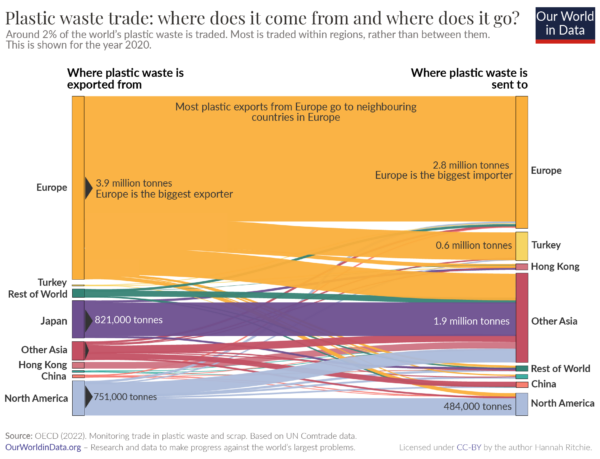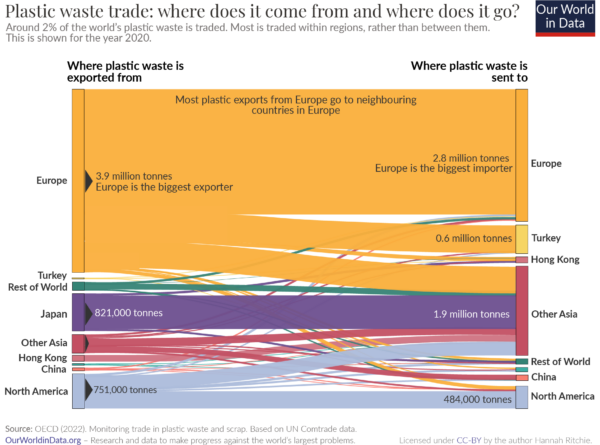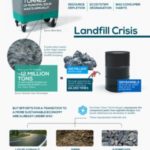What You Should Know About Global Plastic Waste Trade 🌏
Energy Disrupter
Global Plastic Waste Trade 🌏: With our ever-growing dependence on single-use consumer products, plastic waste has long become a global issue. For most countries, this issue goes beyond environmental concerns; it is also an economic one. Every year, significant amounts of plastic are shipped around the world for recycling and disposal – with some leading to illegal dumping in other nations or even being mismanaged domestically. As we explore ongoing developments in the global trade of plastic waste, let’s dive into what you need to know about how this affects our planet.
Let’s face it – plastic is not going anywhere anytime soon. Far too many people see single-use plastics as one of the most essential necessities they should always have. Data heavily backs this claim up as yearly, we produce estimated 400 million tonnes of plastic. Unfortunately, with this absurd amount of plastic that we create, we do not have a fully-circular (i.e., sustainable) way of dealing with them.
We deal with plastic by using these main methods: incineration or landfilling, which eventually leads to polluting our land, air and sea. Additionally, only a small percentage of them make their way into recycling facilities. One other solution that we have been doing for quite some time now, which is relatively less popular than the options mentioned above, is exporting and importing plastic or what we can call as global plastic waste trade. Visual Capitalist recently talked about it in their article, and naturally, it piqued our environment-loving interests.
>Download Now: Free PDF Business Owners Guide To General Waste Bin Services
What is this global plastic waste trade we mentioned? Is it a good or bad way to deal with plastic? And, which countries participate most in this plastic trade? Below, we will cover everything you need to know about it.
Learning more about the global plastic waste trade occurrence
As the name suggests, this occurrence means multiple countries both send out and receive plastic waste. Despite countries participating in this occurrence, only 2 per cent of the world’s total plastic waste is traded internationally. See the graphics below by Our World In Data which uses data from OECD and UN Comtrade which shows the amount of plastic waste traded across borders and which countries export and import the most of it.


Well, the first thing that may come to your mind is, “Why do we need to trade plastics?” One thing that may also come to mind: “Is there any benefit to global plastic waste trade?” We answer that below.
Highly developed countries such as Germany or the US, of course, have fairly advanced recycling facilities to deal with their domestic plastic waste. However, to not overload their own recycling facilities and landfills, and to better manage their plastic waste emissions in a cheap manner, they export them to other (usually developing) countries.
Naturally, one would think sending out plastics is good whilst receiving is bad. But the global plastic waste trade has benefits for the receiving countries, too. First, importing plastic from other countries and recycling them into goods is a cheaper option for industries than buying new, more expensive manufactured plastics. Depending on a country’s needs, it may either export, import or even do both.
Who are the world’s biggest plastic exporters and importers?
Below, see the top 10 leading plastic exporters according to UN Comtrade data:
In addition, see the top 10 leading plastic importers:
When does global plastic waste trade become bad?
As we have mentioned above, both importing and exporting plastics coming from different countries have their fair share of benefits. But alas, with benefits also come detriments.
The main detriment of the global plastic waste trade occurrence is the fact that not all exported plastics are of high quality that they can turn into goods. Some instances have occurred wherein a country, usually, a highly developed one, sends out unusable or hazardous waste to third-world countries. On one end, the exporter gets rid of the ‘bad’ plastic waste, whilst the other receives the useless, unsafe and dangerous waste and ultimately puts it in landfill because of its mentioned uselessness.
There have been recorded instances of this. For example, Canada once sent the Philippines heaps of ‘garbage’, or what we call rubbish here, that they labelled as recyclable, only to find out that they sent household trash, plastic bottles and bags, newspapers, and used adult diapers, according to the Philippines’ Beaureu of Customs. As a result, and as expected, the Philippines sent back 69 containers of useless rubbish back to Canada, where the rubbish came from.
Another instance would be China‘s plastic waste ban. China’s National Sword Policy was put in place to regulate most of the plastic waste they received from other countries. So, what is the main reason for this policy? Of course, to lessen low-quality plastic importation that is hard to sort and recycle and accumulating in rubbish bins and at recyclers.
Waster’s final thoughts on the global waste trade phenomenon
Global plastic waste trade has become a controversial issue as of late, weighing both its benefits and detriments. Whilst some see the plastic waste trade as an excellent way of disposing of waste and ensuring reuse, others worry about the potential long-term environmental implications, such as the release of hazardous chemicals released during incineration.
Along the same lines, managing waste, let alone useless and hazardous ones, is also a concern due to the poor quality of some countries’ recycling systems. Whilst there could be advantages if properly managed, it is critical to consider both environmental implications and safety in order for the global plastic waste trade to become a success.
It is time for governments and corporations alike to come together and discuss possible solutions for this pressing issue. So, what are your thoughts on the global plastic waste trade? Also, how do you think we should address this issue? Share your opinion in the comments below.
Contact Waster right now for your waste and recycling needs now!
Does your Australian-based business need waste and recycling services? If so, then you have come to the right website!
Please call 1300 WASTER (1300 927 837). You can also email us at [email protected] or [email protected] if you have further questions. Find the best deals in terms of waste and recycling pricing and services!
















